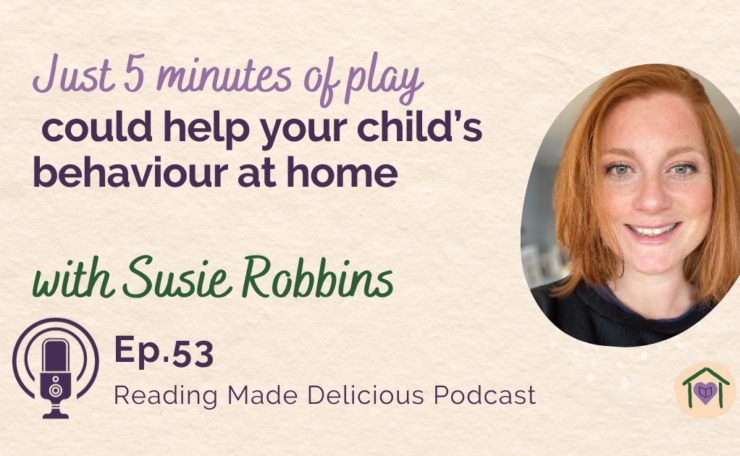How can we use play to help support our child’s emotional literacy and behaviour at home?
Apple Podcasts – Spotify – Amazon Music – Google Podcasts
Children’s behavior can undergo shifts and changes as they navigate new experiences, such as starting school or moving up a year group. These transitions can lead to regressions or challenging behaviors as they adapt to different expectations and environments. As parents, it’s essential to create a positive and supportive space to help children through these changes. Incorporating play and connection is a valuable strategy.
In this episode, I am joined by Susie Robbins from Resolve to Play and she shares how play and some other strategies can be used to help support children at home with managing their behaviour and emotional literacy development.
She shares how we can engage in symbolic play to meet children’s needs for simplicity, embrace their desire for nurturing and comfort, and allow them to lead the way in returning to more childlike behaviors. By offering understanding and opportunities for quality playtime, we can foster emotional resilience and help your children navigate life’s transitions more smoothly.
In this episode, about embracing play to support children’s behaviour and emotional development at home you will learn:
- Regression and challenging behaviors are common in children after major transitions like starting school, and these behaviors can be a child’s way of expressing their need for comfort and simplicity.
- It’s essential to embrace regression by offering nurturing and understanding. Lean into their desire for simpler, childlike behaviors, and engage in activities that provide comfort and connection.
- Restraint collapse is a natural response to the pressures of following new rules and expectations. Allow children plenty of time for decompression and sensory regulation activities.
- Avoid overpacking your child’s schedule with extracurricular activities. Reflect on whether these activities are truly what your child desires or if they are more aligned with your own preferences.
- Spread out their experiences and opportunities to participate in various activities over time, ensuring they have the space to adapt to new demands and challenges. Remember, there’s no rush; the opportunities will still be there in the future.
More about Susie
Susie Robbins, mother of three and creator of the Happy Days Diary is passionate about supporting parents to navigate their children’s behaviour and nurturing their emotional well-being.
Links mentioned in this episode about learning through play:
Reading Made Delicious Resources to help support you
- Download the ultimate guide to using recipes for learning to read and get started with helping your child create memories whilst learning to read today.
- Check out the latest Reading Made Delicious recipes and reading support here
Join our Reading Made Delicious Podcast Community to grow your child’s reading and early learning:
Send me a DM on Instagram. I love chatting with families (and other educators). So send me your thoughts on using play to support your child’s behaviour.
Enjoying the podcast? Thanks for tuning in!
Tag me @reading_made_delicious on Instagram and tell me what you are listening to! I love seeing what resonates most with our listeners!
I don’t want you to miss a thing! Be the first to know when an episode is available by subscribing to your favourite player here Apple Podcasts – Spotify – Amazon Music – Google Podcasts
If you would like to support the Reading Made Delicious Podcast, it would mean so much to me if you would leave a review on iTunes. By leaving a review, you are helping more families to find this and help support their child’s learning journey.
To leave a review on iTunes, click here and scroll down to ratings and reviews. Click ‘write a review’ and share with me how this podcast is helping you grow your child’s learning.
Ready for more? Listen to these Reading Made Delicious Podcast Episodes next:
- How can a learning through play approach be so powerful [Ep 51]
- Helping your child with BIG feelings: Ways to support your child’s emotional literacy [Ep 39]
Content Disclaimer
The information contained above is provided for information purposes only. The contents of this episode are not intended to amount to advice and you should not rely on any of the contents of this podcast. Professional advice should be obtained before taking or refraining from taking any action as a result of the contents of this podcast. Sarah Travers disclaims all liability and responsibility arising from any reliance placed on any of the contents of this episode.


[…] Just 5 minutes of play could help your child’s behaviour at home [Ep 53] […]